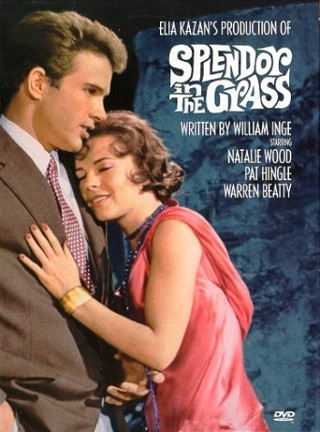Splendor in the Grass (1961)
Splendor in the Grass (1961), directed by Elia Kazan, depicts the story of two teenagers in 1920s Kansas who pursue a romantic relationship that collapses as their parents and society each expect something different from them. The character Wilma Dean “Deanie” Loomis, played by Natalie Wood, struggles to move on with her life after Warren Beatty’s character, Bud Stamper, ends the relationship because of his sexual oppression. Deanie comes from a family with financial struggles and a mother who is dead set on her keeping her virginity, while Bud comes from a well to do family, with a oil baron father who wants nothing more than for Bud to go to Yale and leave Deanie behind. As Bud moves on, Deanie cannot help but grow obsessive over her love, which leads to a plethora of mental breakdowns.

Natalie Wood shows off her amazing acting skills as her character continues to have inner battles with herself. One memorable scene is the bathtub scene where the camera alternates between Deanie and her overbearing mother as they have a conversation about how Deanie has been acting lately. One can see how the mother is in her own bubble, refusing to see and understand the problems that her daughter is facing, while Deanie passionately argues that she is alright when it is clear to everyone that she is the exact opposite. The entire sequence involves Deanie closing her eyes dreamily and being lost in another world, her face contorting in pain from the conversation, the dramatic shoving of her face underwater to get her point across, and her jumping out of the bath unexpectedly and running into her room where she lays face down on her bed, kicking her legs back and forth.
Warren Beatty brings his character to life as well. Instead of feeling complete hatred for him and how he ended his relationship, you are able to feel empathy for him since the camera follows his life too. He tries to live up to his father’s expectations and deal with his wild sister, Ginny, who was also the object of her father’s plans until she broke every rule established in her household. She is one of the supporting characters with many layers. Ginny has moments where she shows her true sweet self and other moments where she is inebriated and trying to upset her father. During the New Year’s Eve party scene, she becomes loud and attracts the attention of every male in the room, much to her father’s displeasure.
Another great thing about this movie is that since it is illustrating the 20s, it has that classic film vibe with the old-fashioned clothing and style of cars. The editing of the scenes was kept to a minimum. The writer and director of the movie made it a little more risqué than the usual movies during that time, which sparked some controversy when it first came out. In fact, this film portrays the first French kiss in a Hollywood film.
Splendor in the Grass is one of Wood’s most popular movies while Warren Beatty is a newcomer in his first movie role. The movie won an Oscar for Best Writing, Story, and Screenplay and was also nominated in the Best Actress in the Leading Role category for Natalie Wood. The screenwriter, William Inge, first wrote the movie as a novel and then as a screenplay. He based it off of people he once knew while growing up in Kansas during the 1920s. The title Splendor in the Grass comes from a line in William Wordsworth’s poem entitled Ode: Intimations of Immortality from Recollections of Early Childhood. In the middle of the movie, Wood’s character even recites the poem in front of the class after the teacher calls her out. The words hint toward the themes of the movie:
Though nothing can bring back the hour
Of splendour in the grass, of glory in the flower;
We will grieve not, rather find
Strength in what remains behind…
Some of the themes in this film include love and obsession, what one wants and what society expects, and the constant need to please your elders. There is a time jump of a few years, which helps keep the movie going without growing uneventful. Some characters make glorious transformations that you may have never expected. Although there are some melodramatic moments that you may not consider to ever happen, there is still realism when it comes to human emotion and the fact that nothing can ever go back to the way it once was. The ending scene of the film sums up the story of Deanie and Bud is a very moving way.











